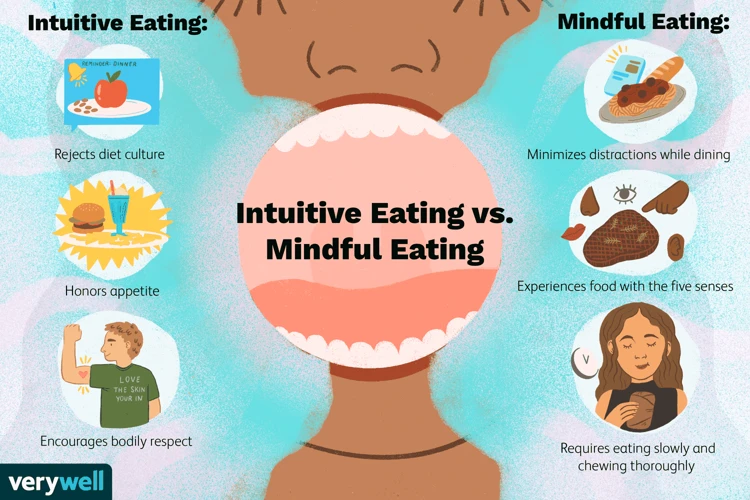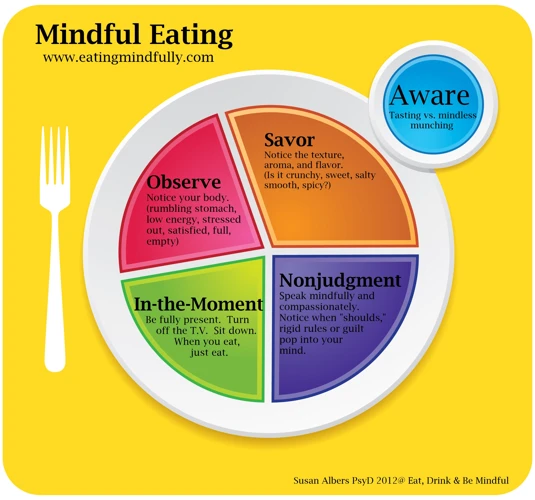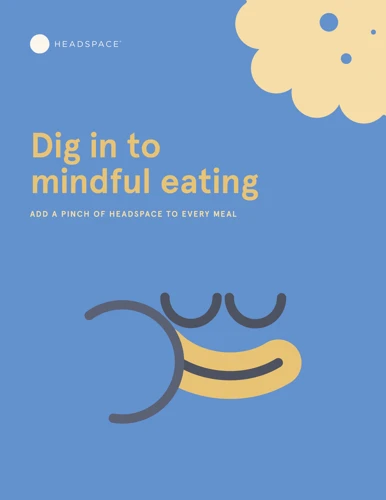Have you ever found yourself devouring an entire bag of chips or a pint of ice cream without even noticing? Or perhaps you find yourself rushing through meals without really enjoying the flavors and textures. These are common experiences in a world where fast-paced living often takes over. However, by practicing savoring and mindful eating, it is possible to break free from the cycle of binge eating and learn to appreciate food in a more meaningful way. In this article, we will explore the differences between savoring and binge eating, why they matter, and practical strategies for incorporating mindful eating into your daily life.
What is Savoring?

Have you ever stopped to truly appreciate the flavors, textures, and aromas of your food? Savoring is the act of mindfully enjoying and relishing the experience of eating. It involves a full engagement of the senses and a present-moment awareness that goes beyond simply consuming food as fuel for the body. By cultivating the practice of savoring, we can enhance our enjoyment of meals, foster a healthier relationship with food, and even improve our overall well-being.
Why is Savoring Important?
Savoring is the practice of fully experiencing and appreciating a sensation, moment, or experience. It involves slowing down, being present, and engaging your senses. But why is it important to savor our experiences? Here are some reasons to consider:
- Enhanced enjoyment: When we savor a positive experience, such as a delicious meal or a beautiful sunset, we prolong the enjoyment and deepen our appreciation of it.
- Reduced overconsumption: By taking the time to truly savor what we are eating, we are more likely to feel satisfied and less likely to overeat or indulge in unhealthy foods.
- Increased gratitude: Savoring allows us to cultivate a sense of gratitude and appreciation for the good things in our lives, which can help promote overall well-being.
- Improved mindfulness: Savoring is a mindfulness practice that can help us become more present and aware in our daily lives.
- Reduced stress: By slowing down and focusing on the positive, we can lower our stress levels and improve our overall mood.
In essence, savoring allows us to fully engage with the present moment, appreciate the positive experiences in our lives, and cultivate a more mindful and fulfilling existence.
How to Practice Savoring
Savoring refers to fully experiencing and enjoying the present moment. Here are some steps to practice savoring:
- Slow Down: Take your time and appreciate your food by eating more slowly. Slow down and pay attention to the flavors, textures, and aromas of your food.
- Engage your Senses: Use all of your senses to engage in the experience. Savor the taste and smell of your food, look at the presentation, and listen to the sounds of the kitchen or the voices of those around you.
- Express Gratitude: Be grateful for the food you have, the people around you, and this moment. Practice gratitude to enhance your experience and to cultivate a more positive outlook.
- Be Present: Avoid distractions such as television or other electronic devices, and instead focus on the meal in front of you. Allow yourself to fully experience the present moment without any distraction.
- Practice Mindfulness: Pay attention to the sensations and feelings that arise while eating. Notice any thoughts that arise, and gently bring your attention back to the present moment.
By savoring your food, you can enjoy the experience more fully and develop a greater appreciation for the present moment. This can also help with maintaining healthy eating habits and avoiding binge eating tendencies.
What is Binge Eating?

Many of us may have experienced overeating or indulging in our favorite foods at some point in our lives. However, when this behavior becomes frequent and uncontrollable, it may be a sign of binge eating. Binge eating is a type of eating disorder characterized by consuming large quantities of food in a short amount of time, often until feeling extremely uncomfortable or even in pain. Those suffering from binge eating disorder may feel guilty and ashamed of their behavior and find it difficult to stop, leading to negative effects on both their physical and mental health. Let’s explore further the harmful effects of binge eating and how to manage this disorder.
Why is Binge Eating Harmful?
Binge eating can be harmful to both physical and mental health. Here are some of the reasons why:
| Physical Effects | Mental Effects |
| Binge eating can lead to obesity, which in turn increases the risk of several health problems such as diabetes, heart disease, and stroke. | The shame and guilt associated with binge eating can lead to low self-esteem, depression, and anxiety. |
| Overeating can put a strain on the digestive system, leading to digestive problems such as bloating, constipation, and diarrhea. | The negative feelings associated with binge eating can trigger the urge to binge again, creating a cycle of emotional eating. |
| Consuming large amounts of unhealthy foods during a binge can lead to nutrient imbalances and deficiencies, which can affect overall health and well-being. | The lack of control associated with binge eating can cause feelings of helplessness and hopelessness. |
| Binge eating can also cause physical discomfort such as stomach pain, headaches, and fatigue. | Binge eating may interfere with personal and professional relationships due to embarrassment and social stigma. |
It’s important to recognize the harmful effects of binge eating and seek help if needed. Developing healthy eating habits and coping mechanisms for dealing with emotions can help prevent and manage binge eating.
How to Identify and Control Binge Eating
One key to controlling binge eating is understanding the triggers that contribute to this behavior. Here are a few steps to help identify and control binge eating:
- Keep a Food Diary: Tracking everything you eat and drink can help you identify patterns and triggers for binge eating. You can start by noting the time of day, location, emotions, and circumstances surrounding each eating episode. This will help you gain insight into your eating habits and provide clues on how to change them.
- Recognize Emotional Eating: Binge eating may be triggered by emotions like stress, anxiety, boredom, or loneliness, among others. Take note of any emotions you feel before or during a binge episode. Once you’ve identified these triggers, you can work on developing healthier coping mechanisms, such as talking to a friend, practicing relaxation techniques, or engaging in physical activity.
- Avoid Trigger Foods: Certain foods or situations can trigger episodes of binge eating. For example, you may find yourself overindulging in high-fat, high-calorie foods when you’re feeling down. Try to avoid keeping these trigger foods within reach, and try to replace them with healthier options that you enjoy.
- Practice Mindful Eating: Rather than eating quickly and mindlessly, try to savor each bite and enjoy the taste, texture, and aroma of your food. This will help you to focus on your body’s signals of hunger and fullness, and avoid overeating.
- Seek Support: Talking to a healthcare provider or therapist can help you work through emotional issues that may be contributing to binge eating. In some cases, medication may be helpful to manage symptoms of depression, anxiety, or other mental health conditions that contribute to binge eating.
By taking the time to identify the triggers behind binge eating, you can learn how to control your eating habits and develop healthier habits. Remember that change takes time and effort, so be patient with yourself and take it one step at a time.
Mindful Eating to Manage Hunger and Cravings

As we strive towards a healthier lifestyle, managing our hunger and cravings is something that often poses a challenge. We may find ourselves reaching for unhealthy snacks or overeating during meals, leading to feelings of guilt and frustration. However, by incorporating mindful eating practices into our daily routine, we can learn to listen to our bodies and make more conscious decisions about what and how much we eat. In this section, we will explore the concept of mindful eating and how it can help us manage our hunger and cravings for a healthier and more fulfilling life.
What is Mindful Eating?
Mindful eating is a practice that involves being fully present and focused while eating, paying attention to every sensation and experience. It involves both a physical and emotional awareness of the food being consumed. This means being aware of the taste, texture, and temperature, as well as the hunger and satiety cues of the body.
Mindful Eating:
| Definition: | A practice of being fully present and focused while eating, paying attention to every sensation and experience. |
| Physical Awareness: | Paying attention to the taste, texture, and temperature of food being consumed. |
| Emotional Awareness: | Being aware of hunger and satiety cues of the body. |
| Benefits: | Helps manage weight, improves digestion, reduces stress, and enhances overall well-being. |
The practice of mindful eating encourages individuals to slow down and savor each bite, which can lead to better digestion and absorption of nutrients. Studies have also shown that it can help manage weight and reduce stress levels. By being more aware of the body’s hunger and satiety cues, individuals can make better food choices and avoid overeating.
Mindful eating is an important tool for developing a healthier relationship with food and improving overall well-being.
How to Practice Mindful Eating
Practicing mindful eating means paying attention to the food that you are eating and how you are eating it. Here are some tips to help you practice mindful eating:
| Tips for Practicing Mindful Eating |
|---|
| Take small bites and chew your food slowly |
| Eat in a relaxed environment |
| Put your utensils down between bites |
| Focus on the flavors and textures of your food |
| Notice how your body feels before, during, and after eating |
| Avoid distractions such as TV or your phone |
| Pause halfway through your meal to assess your hunger/fullness level |
By practicing mindful eating, you can better enjoy your food and understand your body’s hunger cues. Instead of rushing through meals or mindlessly snacking, you can savor every bite and feel more satisfied with what you eat.
Benefits of Mindful Eating

Mindful eating is a practice that offers numerous benefits to both physical and mental health. Studies have shown that individuals who consistently practice mindful eating have better control over their eating habits, improved digestion, reduced stress levels, and are more likely to maintain a healthy weight.
One of the primary benefits of mindful eating is that it helps to control overeating. Research suggests that individuals who practice mindful eating are less likely to consume excessive amounts of food or indulge in impulse eating. By being more aware of their thoughts and emotions, they are able to recognize the triggers that lead to binge eating and avoid them. This can help to prevent weight gain and reduce the risk of obesity and related health conditions.
Another benefit of mindful eating is that it improves digestion. When we eat mindfully, we focus on our food and our bodies more closely. This can help with digestion and nutrient absorption, reducing symptoms of gastrointestinal discomfort such as bloating, gas, and constipation. Additionally, by paying attention to the experience of eating, we may have a greater appreciation for the taste and enjoyment of our food, which can lead to a more positive relationship with eating.
Mindful eating also has a positive impact on mental health. It can reduce stress levels and improve overall well-being. By taking the time to focus on the present moment and our bodily sensations, we can become more aware of our thoughts and emotions, and learn to manage them more effectively. A meta-analysis of multiple studies on the subject found that mindful eating practices can have a significant reduction in anxiety and depression.
Mindful eating is an effective practice for improving both physical and mental health. By being more aware of our food and our bodies, we can avoid binge eating, reduce digestive discomfort, and cultivate a more positive relationship with eating. The practice can reduce stress and improve overall well-being, making it an essential part of a healthy lifestyle.
Strategies for Success
Now that we have discussed the differences between savoring and binge eating, and how mindful eating can help manage hunger and cravings, let’s explore some strategies for successfully incorporating these practices into your daily life. By implementing the following meal planning and preparation, self-care and stress management, and tracking and accountability techniques, you can develop a healthier relationship with food and nourish your body and mind.
Meal Planning and Preparation
One key strategy for successfully practicing mindful eating is through effective meal planning and preparation. This involves creating a plan for what you will eat ahead of time, as well as preparing meals and snacks in advance to have on hand when hunger strikes.
Emphasize Nutritious Foods: When meal planning, it is important to focus on incorporating a variety of nutrient-dense foods into your meals and snacks. This may include fresh fruits and vegetables, lean proteins, whole grains, and healthy fats.
Reduce Temptations: It is also helpful to limit tempting, high-calorie foods in your home and workplace. This can be achieved by avoiding stocking your pantry with foods that trigger mindless eating or buying only small portions as occasional treats.
Portion Control: When preparing meals and snacks, practice portion control by paying attention to recommended serving sizes and dividing your meals into appropriate portions. This can help you avoid overeating while still satisfying your hunger.
Batch Cooking: Another helpful meal preparation strategy is batch cooking. This involves preparing large quantities of food in advance and portioning it out for later use. Batch cooking can save time and money, while also helping you make healthier choices by having nutritious, homemade options readily available.
Use Meal Delivery Services: If you struggle with meal planning and preparation or find yourself pressed for time, consider using meal delivery services. These services provide pre-portioned, nutritious meals that are delivered directly to your doorstep on a regular basis, helping you maintain healthy eating habits without the stress of planning and preparing meals yourself.
Effective meal planning and preparation can greatly support mindful eating habits, making it easier to stick to your health and wellness goals.
Self-Care and Stress Management
One important strategy for success in practicing mindful and nutritious eating habits is self-care and stress management. Strong>Self-care and stress management are crucial for overall well-being, and they can have a direct impact on your eating habits. When you are stressed or overwhelmed, it can be easy to turn to unhealthy foods as a coping mechanism, leading to binge eating or unhealthy snacking.
One way to practice self-care is to make time for relaxation and stress-reducing activities. This can include taking a warm bath, practicing yoga or meditation, or going for a walk outdoors. It is important to prioritize activities that bring you joy and help you unwind.
Another aspect of self-care is to prioritize adequate and quality sleep. Aim for at least 7-8 hours of sleep each night, and try to establish a consistent sleep schedule. Lack of sleep can lead to increased cravings for unhealthy foods, making it more difficult to practice mindful eating habits.
Finally, practicing self-compassion is essential for success in any healthy habit change. Be patient with yourself, and don’t let setbacks discourage you. It’s important to recognize that progress is not always linear, and small steps forward are still steps forward.
Stress management techniques and self-care practices can also vary from person to person. It’s important to find what works best for you and make it a consistent part of your routine.
Here is a table summarizing self-care and stress management strategies for success in mindful eating:
| Self-Care and Stress Management Strategies | Benefits |
|---|---|
| Making time for relaxation and stress-reducing activities (e.g. yoga, meditation, nature walks) | Lowered stress levels and reduced likelihood of turning to unhealthy foods for comfort |
| Prioritizing adequate and quality sleep | Reduced cravings and increased energy levels |
| Practicing self-compassion and patience in the face of setbacks | Reduced stress and increased motivation to continue healthy habits |
Incorporating self-care and stress management techniques into your routine can help set the foundation for success in practicing mindful eating habits. Not only will it benefit your overall well-being, but it can also create a positive cycle of healthy habits and stress reduction.
Tracking and Accountability
Maintaining tracking and accountability can be very helpful in achieving mindful eating goals. You can use various methods to track your progress, such as keeping a food journal, using a mobile application, or even using a spreadsheet. A food journal can help you document your daily food intake, the time you eat, and how you feel before and after eating. This can be useful in identifying patterns in your eating habits and recognizing triggers that may lead to binge eating.
Using a mobile application or a website can also allow you to track your food intake and provide you with helpful information about the nutritional value of your meals. Some of these apps even allow you to scan the barcode on the food packaging to easily input the food item into your tracker. They may also allow you to set goals and analyze your progress over time.
Accountability can also be helpful in maintaining mindful eating habits. You can find an accountability partner or join a support group to help motivate you and keep you on track. Try to find people who share similar goals and challenges so you can relate and encourage each other. Additionally, you can keep a progress journal to document your successes and challenges. This can be a helpful tool to review when you need to stay motivated or make changes to your eating plan.
Maintaining tracking and accountability can be a valuable tool in achieving your mindful eating goals. Experiment with different methods to find what works best for you and stick to your plan to make progress over time.
Conclusion
In conclusion, it is important to recognize the differences between savoring and binge eating and to understand how to practice mindful eating in order to manage hunger and cravings. Savoring is the practice of fully enjoying and appreciating food, which can enhance the taste experience and cultivate a healthier relationship with food. Binge eating, on the other hand, is a harmful behavior that can lead to negative health consequences.
By practicing mindful eating, individuals can become more aware of their thoughts, feelings, and behaviors related to food, which can ultimately help them make better choices and control their urges to binge eat. Mindful eating involves being present in the moment, paying attention to the senses, and listening to internal cues of hunger and fullness.
There are also several strategies for success when it comes to mindful eating, such as meal planning and preparation, self-care and stress management, and tracking and accountability. These strategies can help individuals stay on track with their goals and feel empowered in their food choices.
Overall, practicing savoring, identifying and controlling binge eating, and incorporating mindful eating habits into daily life can lead to numerous benefits, including improved physical and mental health, a healthier relationship with food, and greater overall well-being. It is never too late to start incorporating these practices into one’s lifestyle and reaping the rewards of a healthier, more mindful approach to eating.
Frequently Asked Questions
What is the difference between savoring and binge eating?
Savoring is the practice of fully enjoying and appreciating the taste, smell, and texture of food, while binge eating is the consumption of excessive amounts of food in a short period with loss of control.
Why is savoring important?
Savoring can lead to greater enjoyment and satisfaction with food, as well as better digestion and nutrient absorption.
How can one practice savoring?
Savoring can be practiced by slowing down during meals, taking time to appreciate the flavors and textures, and focusing on the present moment.
What is binge eating disorder?
Binge eating disorder is a mental illness characterized by regular episodes of uncontrollable binge eating, often accompanied by feelings of shame and guilt.
Why is binge eating harmful?
Binge eating can lead to weight gain, obesity, and a higher risk of health problems such as diabetes, heart disease, and certain cancers.
How can one identify and control binge eating?
Identifying binge eating involves recognizing patterns of eating behavior and emotional triggers. Controlling binge eating involves seeking professional help, practicing mindfulness, and establishing healthy eating habits.
What is mindful eating?
Mindful eating involves paying attention to the present moment, non-judgmentally, while eating. It involves being aware of sensations, emotions, and thoughts related to eating.
How can one practice mindful eating?
Practicing mindful eating involves paying attention to hunger and fullness cues, savoring each bite, and avoiding distractions while eating, such as watching TV or using electronic devices.
What are the benefits of mindful eating?
The benefits of mindful eating include improved digestion, better weight management, and a more positive relationship with food.
What strategies can help with successful mindful eating?
Strategies for successful mindful eating include meal planning and preparation, self-care and stress management, and tracking and accountability.







